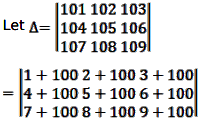
Using the property that if some or all elements of a row or column of a determinant are expressed as the sum of two (or more) terms, then the determinant can be expressed as the sum of two (or more) determinants.

Using the property that If any two rows (or columns) of a determinant are identical (all corresponding elements are same), then the value of the determinant is zero.

Using the property that if the equimultiples of corresponding elements of other rows (or columns) are added to every element of any row (or column) of a determinant, then the value of determinant remains the same.
Using row transformation, R2 → R2 - R1 and R3 = R3 - R1

Using the property that if each element of a row (or a column) of a determinant is multiplied by a constant k, then its value gets multiplied by k.
Taking out factor 2 from R3,

Using the property that If any two rows (or columns) of a determinant are identical (all corresponding elements are same), then the value of the determinant is zero.
Since, R2 and R3 are identical, therefore ∆ = 0.